- লিঙ্ক পান
- X
- ইমেল
- অন্যান্য অ্যাপ
50 Easy Habits That Help You Live Longer, According to Science
BY TINA DONVITO
We asked medical experts for the most impactful things you can do right now to live longer—and stay healthy enough to really enjoy your golden years.
Go for a jog
 ND3000/SHUTTERSTOCKAmong all the things you can do to achieve longevity, one of the most critical is to exercise. Aerobic activity, like running, is crucial for getting your blood pumping and your heart working. A recent studyshowed that a one-hour run adds seven hours to your life, up to four hours per week. People who run have a 25 to 40 percent reduced risk of early death, and live about three years longer, the study says. Of course, people who run are often healthier in general, but running appears to have its own health benefits. "Running helps burn off or keep blood sugars normal, which is important because they keep your kidneys, eyes, nerves and blood vessels healthy," says Jennifer Kuca Hopper, MS, an exercise physiologist and director of employee wellness, worklife, and fitness at Piedmont Healthcare. Running also regulates blood pressure, increases lung capacity, reduces stress, and increases bone density, she says. This is the science behind why running makes you live longer.
ND3000/SHUTTERSTOCKAmong all the things you can do to achieve longevity, one of the most critical is to exercise. Aerobic activity, like running, is crucial for getting your blood pumping and your heart working. A recent studyshowed that a one-hour run adds seven hours to your life, up to four hours per week. People who run have a 25 to 40 percent reduced risk of early death, and live about three years longer, the study says. Of course, people who run are often healthier in general, but running appears to have its own health benefits. "Running helps burn off or keep blood sugars normal, which is important because they keep your kidneys, eyes, nerves and blood vessels healthy," says Jennifer Kuca Hopper, MS, an exercise physiologist and director of employee wellness, worklife, and fitness at Piedmont Healthcare. Running also regulates blood pressure, increases lung capacity, reduces stress, and increases bone density, she says. This is the science behind why running makes you live longer.Eat more plant protein
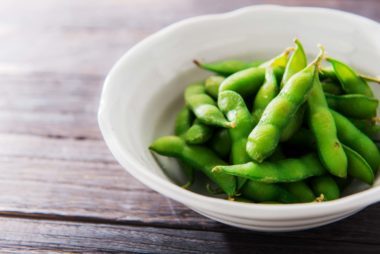 ABC1234/SHUTTERSTOCKA recent studyfrom Harvard found that people who ate a diet high in processed meats like sausage and hot dogs, were at a higher risk of death—but those who got their protein from plants had a lower risk, especially of heart disease-related deaths. "The study said that for every three percent increase in calories from plant protein there was a reduction in risk of death by 10 percent," says Shayna Komar, RD, a dietitian at Piedmont Healthcare. Plant proteins supply all nine amino acids the body can't make on its own, and "unlike animal proteins, plant-based proteins can help lower blood pressure, lower risk of heart disease, and decrease risk of cancer," she says. Find out the top 10 sources of plant protein.
ABC1234/SHUTTERSTOCKA recent studyfrom Harvard found that people who ate a diet high in processed meats like sausage and hot dogs, were at a higher risk of death—but those who got their protein from plants had a lower risk, especially of heart disease-related deaths. "The study said that for every three percent increase in calories from plant protein there was a reduction in risk of death by 10 percent," says Shayna Komar, RD, a dietitian at Piedmont Healthcare. Plant proteins supply all nine amino acids the body can't make on its own, and "unlike animal proteins, plant-based proteins can help lower blood pressure, lower risk of heart disease, and decrease risk of cancer," she says. Find out the top 10 sources of plant protein.Get more sun—but not too much
 MAXPLAY-PHOTOGRAPHER/SHUTTERSTOCKThe "sunshine vitamin"—vitamin D, that is—has been shown to fight to disease, improve bone health, and ward off depression. One study even found it to extend lifespan (of a worm, but still) by 33 percent. But because vitamin D comes from the sun, and our modern lives don't let us spend much time outside, we might not be getting enough. Concerns over skin cancer are well-founded, and sunblock is generally a good idea. But, "getting 15 to 30 minutes of sun exposure a day should be adequate for vitamin D production," says Jyotir Jani, MD, a primary care physician with Piedmont Healthcare. "Of course, that is not through sunbathing but by being outside with normal clothing." Here are more weird ways the sun affects your body.
MAXPLAY-PHOTOGRAPHER/SHUTTERSTOCKThe "sunshine vitamin"—vitamin D, that is—has been shown to fight to disease, improve bone health, and ward off depression. One study even found it to extend lifespan (of a worm, but still) by 33 percent. But because vitamin D comes from the sun, and our modern lives don't let us spend much time outside, we might not be getting enough. Concerns over skin cancer are well-founded, and sunblock is generally a good idea. But, "getting 15 to 30 minutes of sun exposure a day should be adequate for vitamin D production," says Jyotir Jani, MD, a primary care physician with Piedmont Healthcare. "Of course, that is not through sunbathing but by being outside with normal clothing." Here are more weird ways the sun affects your body.Drink coffee
 ARRLEYD80/SHUTTERSTOCKTo the relief of caffeine lovers everywhere, your daily cup of joe may actually have health benefits that could extend your life. "Some research indicates moderate coffee intake may fight against type-2 diabetes, and may even reduce the risk of dementia and heart disease," says Erin Palinski-Wade, RD, CDE and author of Belly Fat Diet For Dummies. A study from Harvard found that those who regularly drank coffee had a reduced risk of death. Komar says coffee also stimulates the nervous system, raising metabolism and increasing the oxidation of fatty acids, which can help with weight loss. Watch out though, if you like your coffee black chances are you're a psychopath.
ARRLEYD80/SHUTTERSTOCKTo the relief of caffeine lovers everywhere, your daily cup of joe may actually have health benefits that could extend your life. "Some research indicates moderate coffee intake may fight against type-2 diabetes, and may even reduce the risk of dementia and heart disease," says Erin Palinski-Wade, RD, CDE and author of Belly Fat Diet For Dummies. A study from Harvard found that those who regularly drank coffee had a reduced risk of death. Komar says coffee also stimulates the nervous system, raising metabolism and increasing the oxidation of fatty acids, which can help with weight loss. Watch out though, if you like your coffee black chances are you're a psychopath.Eat nuts
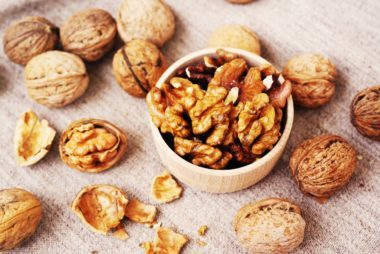 SAVITSKAYA-IRYNA/SHUTTERSTOCKAlthough you may think nuts are unhealthy because they are calorically dense, the exact opposite is true—they can actually extend your life. A study from Harvard found that daily nut-eaters were 20 percent less likely to die during the study. Specifically, the rates of death from cancer, heart and respiratory disease were reduced. Other research has shown walnuts have a huge role in heart health because of the amount of antioxidants they contain. They can also boost brain health, says Barbara Shukitt-Hale, PhD, a USDA Scientist in the Laboratory of Neuroscience and Aging at the USDA/Human Nutrition Research Center on Aging at Tufts University. Plus, nuts are a great source of plant-based protein, Palinski-Wade says. Here are four more reasons to snack on nuts.
SAVITSKAYA-IRYNA/SHUTTERSTOCKAlthough you may think nuts are unhealthy because they are calorically dense, the exact opposite is true—they can actually extend your life. A study from Harvard found that daily nut-eaters were 20 percent less likely to die during the study. Specifically, the rates of death from cancer, heart and respiratory disease were reduced. Other research has shown walnuts have a huge role in heart health because of the amount of antioxidants they contain. They can also boost brain health, says Barbara Shukitt-Hale, PhD, a USDA Scientist in the Laboratory of Neuroscience and Aging at the USDA/Human Nutrition Research Center on Aging at Tufts University. Plus, nuts are a great source of plant-based protein, Palinski-Wade says. Here are four more reasons to snack on nuts.Spice it up
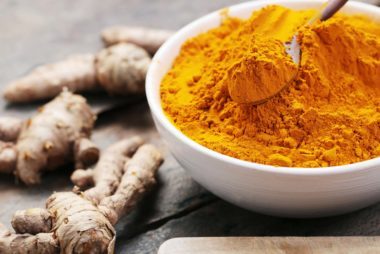 TARAPONG-SRICHAIYOS/SHUTTERSTOCKCertain spices have been touted for their health benefits. "Tumeric has incredible anti-inflammatory properties, which may fight against joint pain and promote a healthier heart," Palinski-Wade says. "Inflammation can accelerate the aging process, so anything that reduces inflammation may help to slow it." Research has found that an antioxidant in tumeric might extend lifespan (in flies, at least), although a recent review questioned some of its benefits. In any case, cooking with the spice may be a healthier alternative to salt or sugar. Another healthy substitute is cinnamon. "Cinnamon may improve insulin sensitivity in the body, helping to reduce the risk of type-2 diabetes," Palinski-Wade says. "Regular consumption may also lower LDL cholesterol levels." Find out more herbs and spices that improve your health.
TARAPONG-SRICHAIYOS/SHUTTERSTOCKCertain spices have been touted for their health benefits. "Tumeric has incredible anti-inflammatory properties, which may fight against joint pain and promote a healthier heart," Palinski-Wade says. "Inflammation can accelerate the aging process, so anything that reduces inflammation may help to slow it." Research has found that an antioxidant in tumeric might extend lifespan (in flies, at least), although a recent review questioned some of its benefits. In any case, cooking with the spice may be a healthier alternative to salt or sugar. Another healthy substitute is cinnamon. "Cinnamon may improve insulin sensitivity in the body, helping to reduce the risk of type-2 diabetes," Palinski-Wade says. "Regular consumption may also lower LDL cholesterol levels." Find out more herbs and spices that improve your health.Don't smoke
 JULIA-VELYCHKO/SHUTTERSTOCKYou probably know this one already. "Smoking cessation is the single most important action that an individual can take regardless of age," Dr. Jani says. It's the leading preventable cause of death in the US, according to the CDC, and the cause of almost every severe health issue, from heart disease to cancer. "Not to mention smoking makes you age faster with increased wrinkles!' Dr. Jani says. In addition, "smoking literally causes internal damage to your genetic code as well as blood vessels and multiple organ systems." And although vaping may be used as a tool to help smokers quit, the jury is still out on its safety, so it's better not to start. These are the 23 best ways to quit smoking.
JULIA-VELYCHKO/SHUTTERSTOCKYou probably know this one already. "Smoking cessation is the single most important action that an individual can take regardless of age," Dr. Jani says. It's the leading preventable cause of death in the US, according to the CDC, and the cause of almost every severe health issue, from heart disease to cancer. "Not to mention smoking makes you age faster with increased wrinkles!' Dr. Jani says. In addition, "smoking literally causes internal damage to your genetic code as well as blood vessels and multiple organ systems." And although vaping may be used as a tool to help smokers quit, the jury is still out on its safety, so it's better not to start. These are the 23 best ways to quit smoking.Drink alcohol in moderation
 IEVGENII-MEYER/SHUTTERSTOCKHeavy drinking increases health risks, but drinking in moderation—particularly red wine—could help you live longer. One study found those who drank lightly (no more than one glass a day for women and two for men) to have reduced risk of death from cardiovascular disease. "Red wine has a small amount of one antioxidant called resveratrol," says Komar. "It is good for overall health, protection from heart disease and decreasing inflammation." Palinski-Wade says wine may also improve blood lipid levels and reduce the risk of dementia. Tap into more benefits of alcohol.
IEVGENII-MEYER/SHUTTERSTOCKHeavy drinking increases health risks, but drinking in moderation—particularly red wine—could help you live longer. One study found those who drank lightly (no more than one glass a day for women and two for men) to have reduced risk of death from cardiovascular disease. "Red wine has a small amount of one antioxidant called resveratrol," says Komar. "It is good for overall health, protection from heart disease and decreasing inflammation." Palinski-Wade says wine may also improve blood lipid levels and reduce the risk of dementia. Tap into more benefits of alcohol.Pump up your pepper intake
 GITA-KULINITCH-STUDIO/SHUTTERSTOCKA recent studyfound that people who eat spicy chili peppers were 13 percent less likely to die than those who don't. Although the link doesn't prove cause and effect, there are some health benefits to specific properties in peppers. "Hot peppers may reduce blood pressure levels thanks to the capsaicin they contain," Palinski-Wade says. "Elevated blood pressure is a risk factor for stroke, heart disease, and even dementia, so regular consumption may lower this risk." If you eat this pepper you could burn over 100 calories.
GITA-KULINITCH-STUDIO/SHUTTERSTOCKA recent studyfound that people who eat spicy chili peppers were 13 percent less likely to die than those who don't. Although the link doesn't prove cause and effect, there are some health benefits to specific properties in peppers. "Hot peppers may reduce blood pressure levels thanks to the capsaicin they contain," Palinski-Wade says. "Elevated blood pressure is a risk factor for stroke, heart disease, and even dementia, so regular consumption may lower this risk." If you eat this pepper you could burn over 100 calories.Stress Less
 PATHDOC/SHUTTERSTOCKThe impact of stress on our overall health is huge, so reducing stress is one way to lower our risk of many deadly diseases. A studyfrom the University of California found that chronically stressed women had significantly lower levels of klotho, a hormone that regulates the aging process. Another study found stress increased the risk of heart attack and stroke. In addition, Dr. Jani says, stress leads to "chemical changes in the body that cause increased harmful particles called free radicals to be released, which can cause damage to organs, raise blood pressure, result in emotional change, and damage genes resulting in mutations that raise the possibility of cancer or psoriasis." Whoa! Reducing stress can also help improve sleep and interpersonal relationships, reduce overuse of drugs and alcohol, and lower stress hormones, says James Dewar, MD, vice chairman of family medicine at the University of Pittsburgh Medical Center. Shut down stress in the moment with these strategies.
PATHDOC/SHUTTERSTOCKThe impact of stress on our overall health is huge, so reducing stress is one way to lower our risk of many deadly diseases. A studyfrom the University of California found that chronically stressed women had significantly lower levels of klotho, a hormone that regulates the aging process. Another study found stress increased the risk of heart attack and stroke. In addition, Dr. Jani says, stress leads to "chemical changes in the body that cause increased harmful particles called free radicals to be released, which can cause damage to organs, raise blood pressure, result in emotional change, and damage genes resulting in mutations that raise the possibility of cancer or psoriasis." Whoa! Reducing stress can also help improve sleep and interpersonal relationships, reduce overuse of drugs and alcohol, and lower stress hormones, says James Dewar, MD, vice chairman of family medicine at the University of Pittsburgh Medical Center. Shut down stress in the moment with these strategies.Pump iron
 BARANQ/SHUTTERSTOCKAlthough you might think aerobic exercise is all you need to do to stay physically active, adding strength trainingto your fitness routine helps you live a longer life, according to Harvard Medical School. A recent study from Penn State showed that older adults who did strength training twice a week had a lower risk of dying. "Weight training builds lean muscle mass, which increases resting metabolic rate, and also improves balance, protects our joints, and strengthens our muscles and bones," Hopper says. You can use your own weight (resistance training), bands, calisthenics, free weights, or weight machines to reap the benefits. "Weight training is the key for allowing the muscles to have the strength and endurance for the body to move during activities of daily living," says Kerry J. Stewart, EdD, director of Clinical and Research Exercise Physiology at Johns Hopkins University School of Medicine.
BARANQ/SHUTTERSTOCKAlthough you might think aerobic exercise is all you need to do to stay physically active, adding strength trainingto your fitness routine helps you live a longer life, according to Harvard Medical School. A recent study from Penn State showed that older adults who did strength training twice a week had a lower risk of dying. "Weight training builds lean muscle mass, which increases resting metabolic rate, and also improves balance, protects our joints, and strengthens our muscles and bones," Hopper says. You can use your own weight (resistance training), bands, calisthenics, free weights, or weight machines to reap the benefits. "Weight training is the key for allowing the muscles to have the strength and endurance for the body to move during activities of daily living," says Kerry J. Stewart, EdD, director of Clinical and Research Exercise Physiology at Johns Hopkins University School of Medicine.Eat more fruits and veggies, period
 NIKOLA-BILIC/SHUTTERSTOCKThe research is clear: If you want to live longer, eat more fruits and vegetables. A recent study from Imperial College London found that those who ate 10 portions of fruit and vegetables a day had the greatest reduction in risk of disease. The study authors estimate 7.8 million deaths worldwide could be prevented every year if people ate this many fruits and veggies—but smaller amounts are beneficial, too. "The vitamins, minerals, and most importantly, the fiber help control satiety so you do not need to eat as much of the animal foods," Komar says. In addition, Dr. Dewar says fiber encourages regular bowel function, which can keep your digestive system working smoothly. "High fiber diets have been found to promote lower cholesterol levels, and reduce the risk of heart disease and certain cancers such as colon cancer," Palinski-Wade says.
NIKOLA-BILIC/SHUTTERSTOCKThe research is clear: If you want to live longer, eat more fruits and vegetables. A recent study from Imperial College London found that those who ate 10 portions of fruit and vegetables a day had the greatest reduction in risk of disease. The study authors estimate 7.8 million deaths worldwide could be prevented every year if people ate this many fruits and veggies—but smaller amounts are beneficial, too. "The vitamins, minerals, and most importantly, the fiber help control satiety so you do not need to eat as much of the animal foods," Komar says. In addition, Dr. Dewar says fiber encourages regular bowel function, which can keep your digestive system working smoothly. "High fiber diets have been found to promote lower cholesterol levels, and reduce the risk of heart disease and certain cancers such as colon cancer," Palinski-Wade says.Be generous and supportive to others
 KOTIN/SHUTTERSTOCKConnecting with other people is a great stress reliever, which can help your long-term health. And the best way to harness these benefits is by focusing not on yourself, but on others. "A study conducted with an elderly population showed that those who engaged in helping others and supporting others ended up living longer lives," says Emma Seppala, PhD, Science Director of Stanford University's Center for Compassion and Altruism Research and author of The Happiness Track. "This was not the case for people who were simply recipients of care and support." Besides lowering stress, helping others could lead to reduced inflammation, which is a precursor to disease, she says. "Individuals who live a 'eudaimonic' lifestyle—a life rich in compassion, altruism, and greater meaning—have surprisingly low levels of inflammation," Dr. Seppala says. Just don't turn into a people pleaser.
KOTIN/SHUTTERSTOCKConnecting with other people is a great stress reliever, which can help your long-term health. And the best way to harness these benefits is by focusing not on yourself, but on others. "A study conducted with an elderly population showed that those who engaged in helping others and supporting others ended up living longer lives," says Emma Seppala, PhD, Science Director of Stanford University's Center for Compassion and Altruism Research and author of The Happiness Track. "This was not the case for people who were simply recipients of care and support." Besides lowering stress, helping others could lead to reduced inflammation, which is a precursor to disease, she says. "Individuals who live a 'eudaimonic' lifestyle—a life rich in compassion, altruism, and greater meaning—have surprisingly low levels of inflammation," Dr. Seppala says. Just don't turn into a people pleaser.Fill up on fish
 BITT24/SHUTTERSTOCKEating healthy fish is an important part of a life-extending diet. "Consume fatty fish such as salmon at least twice a week to boost intake of EPA and DHA omega-3 fatty acids," Palinski-Wade says. "According to NHANES [National Health and Nutrition Examination Survey] data, 95 percent of Americans are deficient in EPA and DHA omega-3s, which can negatively impact longevity." A study from Harvard showed that people with higher levels of the healthy fatty acids in fish oils were 27 percent less likely to die during the study period, and had a 35 percent lower risk of dying from heart disease. Read more surprising omega-3-rich foods that add years to your life.
BITT24/SHUTTERSTOCKEating healthy fish is an important part of a life-extending diet. "Consume fatty fish such as salmon at least twice a week to boost intake of EPA and DHA omega-3 fatty acids," Palinski-Wade says. "According to NHANES [National Health and Nutrition Examination Survey] data, 95 percent of Americans are deficient in EPA and DHA omega-3s, which can negatively impact longevity." A study from Harvard showed that people with higher levels of the healthy fatty acids in fish oils were 27 percent less likely to die during the study period, and had a 35 percent lower risk of dying from heart disease. Read more surprising omega-3-rich foods that add years to your life.Get quality sleep
 PUHHHA/SHUTTERSTOCKWe lead busy lives, and the part of our day that often ends up getting cut is sleep. But if you want to actually have more days in your life, you need enough shut-eye. "People should aim to have at least seven to eight hours of good sleep each night—any less will decrease the immune system," says Sonya W. Thomas, MD, a PIH Health Family Medicine doctor. Studies show that poor sleep can lead to all kinds of health problems, from obesity and heart disease to depression, says sleep expert Richard Shane, PhD, creator of the Sleep Easily method. "Good sleep can help reverse all of those damaging effects, which can help you live longer," he says. In addition, he says good sleep can help your energy level, cognitive function, and personal relationships. "So you don't just live a longer life, you feel good and live a better life," Dr. Shane says.
PUHHHA/SHUTTERSTOCKWe lead busy lives, and the part of our day that often ends up getting cut is sleep. But if you want to actually have more days in your life, you need enough shut-eye. "People should aim to have at least seven to eight hours of good sleep each night—any less will decrease the immune system," says Sonya W. Thomas, MD, a PIH Health Family Medicine doctor. Studies show that poor sleep can lead to all kinds of health problems, from obesity and heart disease to depression, says sleep expert Richard Shane, PhD, creator of the Sleep Easily method. "Good sleep can help reverse all of those damaging effects, which can help you live longer," he says. In addition, he says good sleep can help your energy level, cognitive function, and personal relationships. "So you don't just live a longer life, you feel good and live a better life," Dr. Shane says.Stay young at heart
 MJTH/SHUTTERSTOCKYou're only as old as you feel, and feeling younger may actually help you live longer. Research from University College London found that people who felt three years younger had a lower death rate than those who felt their age or older. One explanation could be that our attitude towards age affects how healthily we live, Harvard psychology professor Ronald D. Diegel says on Harvard's Health Blog. "When people see themselves as old, they're more likely to abandon physical challenges which feel difficult, such as, 'I don't think I should ski anymore, I'm an old man,'" he says. "If we feel old, we're likely to treat food with an 'I won't live much longer, I might as well enjoy this' attitude which could lead us to eat unhealthfully." Find out 24 stay-young secrets from women who don't age.
MJTH/SHUTTERSTOCKYou're only as old as you feel, and feeling younger may actually help you live longer. Research from University College London found that people who felt three years younger had a lower death rate than those who felt their age or older. One explanation could be that our attitude towards age affects how healthily we live, Harvard psychology professor Ronald D. Diegel says on Harvard's Health Blog. "When people see themselves as old, they're more likely to abandon physical challenges which feel difficult, such as, 'I don't think I should ski anymore, I'm an old man,'" he says. "If we feel old, we're likely to treat food with an 'I won't live much longer, I might as well enjoy this' attitude which could lead us to eat unhealthfully." Find out 24 stay-young secrets from women who don't age.Don't sit all day
 FIZKES/SHUTTERSTOCKEven if you don't feel like you can embark on a major fitness regimen, any amount of movement you do can extend your life. A recent studyfound that as little as 10 minutes of light activity a day—even simple things like walking around your home or doing chores—can reduce your risk of dying. On the other hand, Hopper says inactivity may be as bad for you as smoking! "This lack of stimulus to the muscles, even just a lack of standing or taking a short walk every hour or two, can produce harmful effects such as an increased risk of heart disease, diabetes, and many forms of cancer like breast and colon," says Dr. Stewart. "Sitting all day slows down the body metabolism so fewer calories are being burned, and levels of blood sugar and cholesterol can increase." Here are more scary things sitting does to your health.
FIZKES/SHUTTERSTOCKEven if you don't feel like you can embark on a major fitness regimen, any amount of movement you do can extend your life. A recent studyfound that as little as 10 minutes of light activity a day—even simple things like walking around your home or doing chores—can reduce your risk of dying. On the other hand, Hopper says inactivity may be as bad for you as smoking! "This lack of stimulus to the muscles, even just a lack of standing or taking a short walk every hour or two, can produce harmful effects such as an increased risk of heart disease, diabetes, and many forms of cancer like breast and colon," says Dr. Stewart. "Sitting all day slows down the body metabolism so fewer calories are being burned, and levels of blood sugar and cholesterol can increase." Here are more scary things sitting does to your health.Eat berries
 VERITY-SNAPS-PHOTOGRAPHY/SHUTTERSTOCKBerriesare known as one of the best sources of antioxidants, which can help prevent cell damage as we age. "Berry fruit have received considerable attention due to their high concentrations of antioxidant and anti-inflammatory phytochemicals," Dr. Shukitt-Hale says. "These phytochemicals have the ability to alter cellular function by reducing oxidative and inflammatory stressors. Their bioactive properties have the potential to prevent or delay brain aging." In other words, they can help prevent age-related cognitive decline, she says. In addition, Palinski-Wade says they can prevent cancer and heart disease.
VERITY-SNAPS-PHOTOGRAPHY/SHUTTERSTOCKBerriesare known as one of the best sources of antioxidants, which can help prevent cell damage as we age. "Berry fruit have received considerable attention due to their high concentrations of antioxidant and anti-inflammatory phytochemicals," Dr. Shukitt-Hale says. "These phytochemicals have the ability to alter cellular function by reducing oxidative and inflammatory stressors. Their bioactive properties have the potential to prevent or delay brain aging." In other words, they can help prevent age-related cognitive decline, she says. In addition, Palinski-Wade says they can prevent cancer and heart disease.Keep your brain active
 ANTON_IVANOV/SHUTTERSTOCKYour brain also needs some exercise, so give it a mental workoutto reduce the risk of dementia and Alzheimer's. Studies have shown that keeping the brain stimulated leads to improved cognitive functioning for longer. "The best ways to keep your brain active and sharp is practicing activities that focuses the mind," Dr. Jani says. "Constantly learning new things or expanding one's knowledge in their profession also helps tremendously." Dr. Dewar also suggests social engagement, hobbies, and puzzles. "Problem solving keeps the brain working," he says. One way to keep your brain active is to do puzzles. Try to solve this one by finding the one image that isn't like the others.
ANTON_IVANOV/SHUTTERSTOCKYour brain also needs some exercise, so give it a mental workoutto reduce the risk of dementia and Alzheimer's. Studies have shown that keeping the brain stimulated leads to improved cognitive functioning for longer. "The best ways to keep your brain active and sharp is practicing activities that focuses the mind," Dr. Jani says. "Constantly learning new things or expanding one's knowledge in their profession also helps tremendously." Dr. Dewar also suggests social engagement, hobbies, and puzzles. "Problem solving keeps the brain working," he says. One way to keep your brain active is to do puzzles. Try to solve this one by finding the one image that isn't like the others.Maintain friendships
 MONKEY-BUSINESS-IMAGES/SHUTTERSTOCKThose who connect with others in meaningful ways have a greater chance of a long life, Dr. Seppala says. "Having strong social relationships predicts a 50 percent increased chance of longevity," she says. "Research suggests that connecting with others in a meaningful way helps us enjoy better mental and physical health, even speeding up recovery from disease." A landmark study from the University of Michigan showed an increased risk of death among people who had a low quantity and quality of social relationships. "Social connection is linked to positive emotions and many health benefits including better immune function," Dr. Seppala says. Read the secrets of lifelong friends.
MONKEY-BUSINESS-IMAGES/SHUTTERSTOCKThose who connect with others in meaningful ways have a greater chance of a long life, Dr. Seppala says. "Having strong social relationships predicts a 50 percent increased chance of longevity," she says. "Research suggests that connecting with others in a meaningful way helps us enjoy better mental and physical health, even speeding up recovery from disease." A landmark study from the University of Michigan showed an increased risk of death among people who had a low quantity and quality of social relationships. "Social connection is linked to positive emotions and many health benefits including better immune function," Dr. Seppala says. Read the secrets of lifelong friends.Follow the Japanese way of eating
 MCKYARTSTUDIO/SHUTTERSTOCKIn addition to eating lots of veggies and fish, stop eating before you're full—a tradition called "hara hachi bu" in Japan. Eating this way works for the Japanese, who have the highest life expectancy in the world, according to a recent study. In addition, "try some bitter melon, which has been promoting health in the Okinawan diet for centuries," Komar says. "This is notable because the older people on Okinawa appear to be the healthiest elderly population in the world." Here are more reasons the Japanese are the healthiest in the world.
MCKYARTSTUDIO/SHUTTERSTOCKIn addition to eating lots of veggies and fish, stop eating before you're full—a tradition called "hara hachi bu" in Japan. Eating this way works for the Japanese, who have the highest life expectancy in the world, according to a recent study. In addition, "try some bitter melon, which has been promoting health in the Okinawan diet for centuries," Komar says. "This is notable because the older people on Okinawa appear to be the healthiest elderly population in the world." Here are more reasons the Japanese are the healthiest in the world.Stretch
 BARANQ/SHUTTERSTOCKAccording to research, how far you can stretch might be an indicator of how stiff your arteries are, a risk factor for cardiovascular disease. "We can prevent a host of health problems by adopting a safe and convenient activity plan that includes stretching," Hopper says. Stretching and flexibility exercises also help joint health, minimizing the risk of arthritis, which leads to less ability to exercise. It's also great for fall prevention, Dr. Stewart says. "About one out of four people over the age of 65 experience a serious fall each year, which is a major cause of death and disability," he says. "Persons who perform these exercises are less likely to lose their balance or 'catch' themselves, and reduce the speed of the fall if they slip or trip." Dr. Thomas suggests taking dance or yoga, which can increase flexibility while at the same time providing a stress-reducing mind-body experience.
BARANQ/SHUTTERSTOCKAccording to research, how far you can stretch might be an indicator of how stiff your arteries are, a risk factor for cardiovascular disease. "We can prevent a host of health problems by adopting a safe and convenient activity plan that includes stretching," Hopper says. Stretching and flexibility exercises also help joint health, minimizing the risk of arthritis, which leads to less ability to exercise. It's also great for fall prevention, Dr. Stewart says. "About one out of four people over the age of 65 experience a serious fall each year, which is a major cause of death and disability," he says. "Persons who perform these exercises are less likely to lose their balance or 'catch' themselves, and reduce the speed of the fall if they slip or trip." Dr. Thomas suggests taking dance or yoga, which can increase flexibility while at the same time providing a stress-reducing mind-body experience.Find purpose
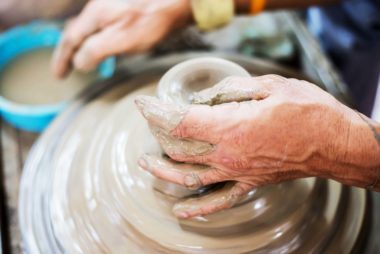 ARNON.PT/SHUTTERSTOCKWhen you have something to live for, you just might end up sticking around a little longer. And science backs this up—a study from University College London found that among over 9,000 people over age 65, those who had the greatest sense of purpose in their life were 30 percent less likely to die during the next eight years than those with the lowest sense of purpose. "Studies show that creating meaning in life brings happiness and greater health," says psychologist Deborah Serani, PsyD, author of Depression in Later Life and a professor at Adelphi University. Create a bucket list to make your life more meaningful.
ARNON.PT/SHUTTERSTOCKWhen you have something to live for, you just might end up sticking around a little longer. And science backs this up—a study from University College London found that among over 9,000 people over age 65, those who had the greatest sense of purpose in their life were 30 percent less likely to die during the next eight years than those with the lowest sense of purpose. "Studies show that creating meaning in life brings happiness and greater health," says psychologist Deborah Serani, PsyD, author of Depression in Later Life and a professor at Adelphi University. Create a bucket list to make your life more meaningful.Think positive
 JACOB-LUND/SHUTTERSTOCKA positive outlook on life in general has also been shown to increase lifespan. A recent study from Harvard looked at how levels of optimism affected different health problems, and found the most optimistic people had a 16 percent lower risk of death from cancer, a 38 percent lower risk of death from heart disease and respiratory disease, and a 39 percent lower risk of dying from stroke. The researchers believe that having a positive outlook makes you more likely to engage in healthy behaviors like exercising and eating right; but that it might also be connected to lower levels of inflammation. Develop a positive attitude in six easy steps.
JACOB-LUND/SHUTTERSTOCKA positive outlook on life in general has also been shown to increase lifespan. A recent study from Harvard looked at how levels of optimism affected different health problems, and found the most optimistic people had a 16 percent lower risk of death from cancer, a 38 percent lower risk of death from heart disease and respiratory disease, and a 39 percent lower risk of dying from stroke. The researchers believe that having a positive outlook makes you more likely to engage in healthy behaviors like exercising and eating right; but that it might also be connected to lower levels of inflammation. Develop a positive attitude in six easy steps.
CONTENT CONTINUES BELOW AD
Walk
 VTT-STUDIO/SHUTTERSTOCKIf you find running too intensive, even taking a brisk 20-minute walk a day is beneficial. According to research presentedat the European Society of Cardiology, 25 minutes a day of moderate exercise, including brisk walking, can add three to seven years to your life. "An advantage of walking over running is that nearly the same health benefits can be obtained but with a much reduced risk of muscle and joint injury," Dr. Stewart says. "So an active lifestyle can be maintained for many, many years while protecting against heart disease, diabetes, and cancer." Hopper says her favorite walking hack is to walk 15 minutes in one direction. Then, "turn around and walk back to where you started—you will have 30 minutes of walking done before you know it!" she says. Here are 15 great reasons to take a 15-minute walk.
VTT-STUDIO/SHUTTERSTOCKIf you find running too intensive, even taking a brisk 20-minute walk a day is beneficial. According to research presentedat the European Society of Cardiology, 25 minutes a day of moderate exercise, including brisk walking, can add three to seven years to your life. "An advantage of walking over running is that nearly the same health benefits can be obtained but with a much reduced risk of muscle and joint injury," Dr. Stewart says. "So an active lifestyle can be maintained for many, many years while protecting against heart disease, diabetes, and cancer." Hopper says her favorite walking hack is to walk 15 minutes in one direction. Then, "turn around and walk back to where you started—you will have 30 minutes of walking done before you know it!" she says. Here are 15 great reasons to take a 15-minute walk.Volunteer
 SYDA-PRODUCTIONS/SHUTTERSTOCKThe health benefits of helping others don't just apply to people you know. Research has also found volunteering to be good for you. "A study by the University of Michigan showed that volunteerism predicts a longer life," Dr. Seppala says. "Interestingly, volunteerism lengthened lives only when the volunteerism was done for selfless reasons." The connection isn't totally clear, but according to Harvard Medical School, volunteering may lower blood pressure, reduce stress, and reduce depression.
SYDA-PRODUCTIONS/SHUTTERSTOCKThe health benefits of helping others don't just apply to people you know. Research has also found volunteering to be good for you. "A study by the University of Michigan showed that volunteerism predicts a longer life," Dr. Seppala says. "Interestingly, volunteerism lengthened lives only when the volunteerism was done for selfless reasons." The connection isn't totally clear, but according to Harvard Medical School, volunteering may lower blood pressure, reduce stress, and reduce depression.Have sex
 GPOINTSTUDIO/SHUTTERSTOCKAlthough there are some obstacles to sex as we age(vaginal dryness in women; erectile dysfunction in men), continuing to get busy could help extend our lives. "People who remain sexually active as they age do tend to live longer," says Dr. Dewar. Although that could be because healthy people tend to have more sex, research has shown some specific health benefits to doing the deed. It releases oxytocin, the "feel good hormone," reduces stress, lowers blood pressure, and helps you sleep. One study even showed that having orgasms reduced the risk of prostate cancer. "It represents being physically able and active, which increases longevity," Dr. Dewar says. "It also usually represents having meaningful, positive emotional relationships, which help increase the quality and quantity of life."
GPOINTSTUDIO/SHUTTERSTOCKAlthough there are some obstacles to sex as we age(vaginal dryness in women; erectile dysfunction in men), continuing to get busy could help extend our lives. "People who remain sexually active as they age do tend to live longer," says Dr. Dewar. Although that could be because healthy people tend to have more sex, research has shown some specific health benefits to doing the deed. It releases oxytocin, the "feel good hormone," reduces stress, lowers blood pressure, and helps you sleep. One study even showed that having orgasms reduced the risk of prostate cancer. "It represents being physically able and active, which increases longevity," Dr. Dewar says. "It also usually represents having meaningful, positive emotional relationships, which help increase the quality and quantity of life."Take care of your teeth
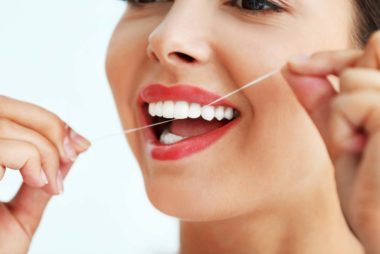 AFRICA-STUDIO/SHUTTERSTOCKThe condition of your teeth could be a reflection of your overall health, so daily brushing and flossing may help extend your life. Studies have shown a link between poor oral health and risk of death, and gum disease has also been associated with mouth cancer, heart disease, and diabetes. "There is a connection, but it is complex and not completely understood," says Dr. Dewar. "Healthy teeth lower the amount of bad bacteria in the body and also allow us to eat a fuller and more diverse diet—things all improve overall health." Your dentist can also help prevent pneumonia.
AFRICA-STUDIO/SHUTTERSTOCKThe condition of your teeth could be a reflection of your overall health, so daily brushing and flossing may help extend your life. Studies have shown a link between poor oral health and risk of death, and gum disease has also been associated with mouth cancer, heart disease, and diabetes. "There is a connection, but it is complex and not completely understood," says Dr. Dewar. "Healthy teeth lower the amount of bad bacteria in the body and also allow us to eat a fuller and more diverse diet—things all improve overall health." Your dentist can also help prevent pneumonia.Skip soda
 KAZITAFAHNIZEER/SHUTTERSTOCKNot surprisingly, soda won't help extend your life—a Harvard studyfound that consuming soda and other sweetened drinks is linked with a greater chance of metabolic syndrome and type 2 diabetes. "Your body will perform better for you when you fuel it well, and drinking sugary beverages can be a very slippery slope because it is anything but good fuel," Komar says. In addition to sugar, it may contain lots of sodium, additives, chemicals, and dyes. "There is also strong evidence that indicates sugar-sweetened soft drinks contribute to the development of diabetes, obesity, metabolic syndrome, and heart disease," she says. Plus, soda can damage tooth enamel, leading to dental issues, she says.
KAZITAFAHNIZEER/SHUTTERSTOCKNot surprisingly, soda won't help extend your life—a Harvard studyfound that consuming soda and other sweetened drinks is linked with a greater chance of metabolic syndrome and type 2 diabetes. "Your body will perform better for you when you fuel it well, and drinking sugary beverages can be a very slippery slope because it is anything but good fuel," Komar says. In addition to sugar, it may contain lots of sodium, additives, chemicals, and dyes. "There is also strong evidence that indicates sugar-sweetened soft drinks contribute to the development of diabetes, obesity, metabolic syndrome, and heart disease," she says. Plus, soda can damage tooth enamel, leading to dental issues, she says.Tie the knot
 HDESERT/SHUTTERSTOCKAlthough it may not seem like it when you're bickering like an old married couple, those who've partnered up are less likely to die in midlife, according to a study from Duke University. The study authors believe that the emotional and functional social support is related to mortality. "Once he is widowed, a man's life expectancy goes down dramatically," Dr. Dewar says. Of course, this assumes that the foundation of the marriage is a happy, loving one. "One way in which love may boost our health is by buffering us from the negative effects of stress and by helping promote positive feelings," Dr. Seppala says. "Even at the cellular level, our health and well-being thrive in a social context in which we can feel and express love." According to Harvard Medical School, marriage improves the risk of heart disease, Alzheimer's, blood sugar levels, and cancer outcomes.
HDESERT/SHUTTERSTOCKAlthough it may not seem like it when you're bickering like an old married couple, those who've partnered up are less likely to die in midlife, according to a study from Duke University. The study authors believe that the emotional and functional social support is related to mortality. "Once he is widowed, a man's life expectancy goes down dramatically," Dr. Dewar says. Of course, this assumes that the foundation of the marriage is a happy, loving one. "One way in which love may boost our health is by buffering us from the negative effects of stress and by helping promote positive feelings," Dr. Seppala says. "Even at the cellular level, our health and well-being thrive in a social context in which we can feel and express love." According to Harvard Medical School, marriage improves the risk of heart disease, Alzheimer's, blood sugar levels, and cancer outcomes.Age gratefully
 SYDA-PRODUCTIONS/SHUTTERSTOCKWe've all heard about aging gracefully, but it's important to age gratefully as well—meaning if you think of a long life in positive terms, you're more likely to have one! Research has proven that cultivating gratitude increases well-being. "Conscious aging is sometimes referred to as vital aging, successful aging, or grateful aging, and the science behind it says that we can live longer by learning to become appreciative of the aging process," Dr. Serani says. Growing old is better than the alternative, right? "When you put your focus on the positive aspects of an experience, you tend to find acceptance," she says. This can help you prioritize what's important, reduce stress, and give you the motivation to stay active and eat well. Don't miss these eight aging myths, debunked.
SYDA-PRODUCTIONS/SHUTTERSTOCKWe've all heard about aging gracefully, but it's important to age gratefully as well—meaning if you think of a long life in positive terms, you're more likely to have one! Research has proven that cultivating gratitude increases well-being. "Conscious aging is sometimes referred to as vital aging, successful aging, or grateful aging, and the science behind it says that we can live longer by learning to become appreciative of the aging process," Dr. Serani says. Growing old is better than the alternative, right? "When you put your focus on the positive aspects of an experience, you tend to find acceptance," she says. This can help you prioritize what's important, reduce stress, and give you the motivation to stay active and eat well. Don't miss these eight aging myths, debunked.Stay hydrated
 OPPORTUNITY_327/SHUTTERSTOCKWe are made of mostly water, so keeping sufficiently hydrated helps our body work better, longer. "Adequate hydration is essential for promoting optimal health," Palinski-Wade says. "Drinking water can help to allow all of your body systems to function correctly, including the kidneys and liver to function optimally." Plus, a University of Illinois study found that increasing water consumption by one to three cups could reduce calorie intake by up to 200 a day, so it's a great weight-loss aid. "In addition, adequate hydration promotes healthier, more subtle skin, which may promote a more youthful appearance," Palinski-Wade says.
OPPORTUNITY_327/SHUTTERSTOCKWe are made of mostly water, so keeping sufficiently hydrated helps our body work better, longer. "Adequate hydration is essential for promoting optimal health," Palinski-Wade says. "Drinking water can help to allow all of your body systems to function correctly, including the kidneys and liver to function optimally." Plus, a University of Illinois study found that increasing water consumption by one to three cups could reduce calorie intake by up to 200 a day, so it's a great weight-loss aid. "In addition, adequate hydration promotes healthier, more subtle skin, which may promote a more youthful appearance," Palinski-Wade says.Find moments of awe
 KINGA/SHUTTERSTOCKNothing makes you feel like you want to stick around planet Earth a little longer than witnessing some of life's most awe-inspiring sights, tastes, and sounds. Research from the University of California has shown how experiencing awe brings out positive emotions—and it can actually impact physical health by reducing inflammation and lowering the risk of heart disease, diabetes, and even Alzheimer's. "Perhaps one of the most important pieces to creating meaning in your life as you age is to always keep a sense of awe," Dr. Serani says. "The world is a place that we often don't get to explore when we're young, so when we get older, we have a chance to do that and experience moments that truly touch our soul."
KINGA/SHUTTERSTOCKNothing makes you feel like you want to stick around planet Earth a little longer than witnessing some of life's most awe-inspiring sights, tastes, and sounds. Research from the University of California has shown how experiencing awe brings out positive emotions—and it can actually impact physical health by reducing inflammation and lowering the risk of heart disease, diabetes, and even Alzheimer's. "Perhaps one of the most important pieces to creating meaning in your life as you age is to always keep a sense of awe," Dr. Serani says. "The world is a place that we often don't get to explore when we're young, so when we get older, we have a chance to do that and experience moments that truly touch our soul."Take a vacation
 GOODLUZ/SHUTTERSTOCKWe often find these awe-inspiring moments when traveling—and science says simply checking out on a vacation could be one way how to live longer. One large study of middle-aged men at high risk for heart disease found that those who took annual vacations were less likely to die. Another study found similar results in women. "I am a huge proponent of taking time off and in scheduling vacations to help not only reduce stress, but to increase an individual's overall happiness," says Dr. Thomas. "Those with less stress have a stronger immune system and may be more likely to fight off cancer-causing agents. It is also important to take time off if you feel your body needs the rest." Can't afford a luxury vaca? Have a stay-cation instead, which can also help in stress reduction, Dr. Thomas says. Plus, here's scientific proof vacationing helps your career.
GOODLUZ/SHUTTERSTOCKWe often find these awe-inspiring moments when traveling—and science says simply checking out on a vacation could be one way how to live longer. One large study of middle-aged men at high risk for heart disease found that those who took annual vacations were less likely to die. Another study found similar results in women. "I am a huge proponent of taking time off and in scheduling vacations to help not only reduce stress, but to increase an individual's overall happiness," says Dr. Thomas. "Those with less stress have a stronger immune system and may be more likely to fight off cancer-causing agents. It is also important to take time off if you feel your body needs the rest." Can't afford a luxury vaca? Have a stay-cation instead, which can also help in stress reduction, Dr. Thomas says. Plus, here's scientific proof vacationing helps your career.Eat cleanly
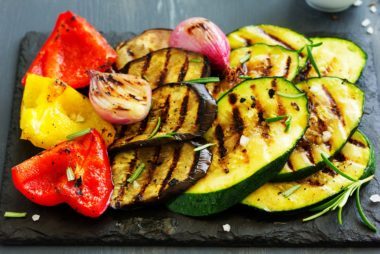 LESYA-DOLYUK/SHUTTERSTOCKOverall, the best strategy for a long-life diet is to eat "cleanly," with as many natural, whole foods as possible. "Thinking about clean eating, food in its natural form can help with longevity," Komar says. "Vegetables rich in yellow, orange, and green hues. Lots of fresh herbs and spices, including turmeric, garlic, ginger, and cinnamon. Meat, dairy, and all processed meats are eaten in very small amounts, if at all. Lots of berries but fruit in moderation overall. Limiting added sugar all together." Read about the 20 healthiest foods to eat in every food group.
LESYA-DOLYUK/SHUTTERSTOCKOverall, the best strategy for a long-life diet is to eat "cleanly," with as many natural, whole foods as possible. "Thinking about clean eating, food in its natural form can help with longevity," Komar says. "Vegetables rich in yellow, orange, and green hues. Lots of fresh herbs and spices, including turmeric, garlic, ginger, and cinnamon. Meat, dairy, and all processed meats are eaten in very small amounts, if at all. Lots of berries but fruit in moderation overall. Limiting added sugar all together." Read about the 20 healthiest foods to eat in every food group.Own a pet
 LESYA-DOLYUK/SHUTTERSTOCKOur connections to others don't need to be of the human variety to add years to our lives. Scientists are just now discovering why this is, although any pet owner will tell you their furry friends make them happier. Studieshave shown interacting with animals lowers the stress hormone cortisol and increases the feel-good hormone oxytocin, and reduces blood pressure and cardiovascular risk. Dogs also encourage exercise. The American Heart Association even put out a report endorsing the health advantages of pets—but of course, you must like animals to reap these benefits. "If you hate cats, owning one won't improve your life—and if you live longer it will be in misery!" says Dr. Dewar. Here are more health benefits to having pets.
LESYA-DOLYUK/SHUTTERSTOCKOur connections to others don't need to be of the human variety to add years to our lives. Scientists are just now discovering why this is, although any pet owner will tell you their furry friends make them happier. Studieshave shown interacting with animals lowers the stress hormone cortisol and increases the feel-good hormone oxytocin, and reduces blood pressure and cardiovascular risk. Dogs also encourage exercise. The American Heart Association even put out a report endorsing the health advantages of pets—but of course, you must like animals to reap these benefits. "If you hate cats, owning one won't improve your life—and if you live longer it will be in misery!" says Dr. Dewar. Here are more health benefits to having pets.Watch cat videos
 SOLIS-IMAGES/SHUTTERSTOCKAllergic to animals but still think they're cute? Try going online instead. The popularity of cat videos attests that the cute critters must be doing something to improve people's moods. A study from Indiana University found that viewing cat videos gave participants more energy and positivity, and felt less negative emotions like anxiety. The study authors believe the videos might have the same positive impact on health as pet therapy. Find out more reasons why funny cat videos are good for you.
SOLIS-IMAGES/SHUTTERSTOCKAllergic to animals but still think they're cute? Try going online instead. The popularity of cat videos attests that the cute critters must be doing something to improve people's moods. A study from Indiana University found that viewing cat videos gave participants more energy and positivity, and felt less negative emotions like anxiety. The study authors believe the videos might have the same positive impact on health as pet therapy. Find out more reasons why funny cat videos are good for you.Have kids
 TOMKAWILA/SHUTTERSTOCKYou might feel like your children are giving you gray hairs, but in reality, having kidscan positively influence how long you live. A recent study from Sweden found that men and women lived longer past the age of 60 if they had children. In addition, the association between having children and living longer was especially true for those who were unmarried at the time of the study. "That the association was somewhat stronger for the non-married may suggest that social support is a possible explanation," the authors wrote.
TOMKAWILA/SHUTTERSTOCKYou might feel like your children are giving you gray hairs, but in reality, having kidscan positively influence how long you live. A recent study from Sweden found that men and women lived longer past the age of 60 if they had children. In addition, the association between having children and living longer was especially true for those who were unmarried at the time of the study. "That the association was somewhat stronger for the non-married may suggest that social support is a possible explanation," the authors wrote.Babysit grandkids
 VGSTOCKSTUDIOV/SHUTTERSTOCKIf having kids helps you live longer, then you can likely also reap the benefits of being a grandparent. A recent study from Australia found that people over 70 who sometimes watched their grandchildren were more likely to be alive 10 years later; among those who didn't, half were dead five years after the start of the study. Besides keeping you physically active, grandchildren also help you tap into the benefits of social connection. "A key to living longer involves taking time to nurture all kinds of social attachments," Dr. Serani says. "This means making time for your spouse, your children, grandchildren, and friends." Here are more reasons being a grandparent is good for your health.
VGSTOCKSTUDIOV/SHUTTERSTOCKIf having kids helps you live longer, then you can likely also reap the benefits of being a grandparent. A recent study from Australia found that people over 70 who sometimes watched their grandchildren were more likely to be alive 10 years later; among those who didn't, half were dead five years after the start of the study. Besides keeping you physically active, grandchildren also help you tap into the benefits of social connection. "A key to living longer involves taking time to nurture all kinds of social attachments," Dr. Serani says. "This means making time for your spouse, your children, grandchildren, and friends." Here are more reasons being a grandparent is good for your health.Practice preventative medicine
 ANDREY_POPOV/SHUTTERSTOCKNo one likes going to the doctor, but having all recommended checkups and preventative screenings for your age, sex, and family history is worth it. "Regular screening checkups can increase your life by potentially finding preventable or modifiable diseases in their infancy," says Dr. Jani. "If blood pressure, diabetes, and cholesterol are found earlier and treated adequately through lifestyle changes and/or medication, then a potential future heart attack or stroke can be prevented." Although some research has questioned whether annual doctor visits improve health outcomes, you still should have all preventative screenings your doctor recommends. Find out 10 things you shouldn't do before a doctor's appointment.
ANDREY_POPOV/SHUTTERSTOCKNo one likes going to the doctor, but having all recommended checkups and preventative screenings for your age, sex, and family history is worth it. "Regular screening checkups can increase your life by potentially finding preventable or modifiable diseases in their infancy," says Dr. Jani. "If blood pressure, diabetes, and cholesterol are found earlier and treated adequately through lifestyle changes and/or medication, then a potential future heart attack or stroke can be prevented." Although some research has questioned whether annual doctor visits improve health outcomes, you still should have all preventative screenings your doctor recommends. Find out 10 things you shouldn't do before a doctor's appointment.Experience nature
 JOHN_T/SHUTTERSTOCKThink about how you feel when you take a walk in the park—good, right? Research has shown exposure to nature can help mental health, and the benefits of going green may even help you live longer. A Harvard study found that people who live in areas with more vegetation and green areas have a 12 percent lower rate of mortality. The researchers think greenery encourages people to go outside for exercise and social connection with others. Plus, plants help clean the air and reduce pollution. Find out why the trend of forest bathing has many health benefits, including lower stress levels, heart rate, and blood pressure, and a boost in immune function.
JOHN_T/SHUTTERSTOCKThink about how you feel when you take a walk in the park—good, right? Research has shown exposure to nature can help mental health, and the benefits of going green may even help you live longer. A Harvard study found that people who live in areas with more vegetation and green areas have a 12 percent lower rate of mortality. The researchers think greenery encourages people to go outside for exercise and social connection with others. Plus, plants help clean the air and reduce pollution. Find out why the trend of forest bathing has many health benefits, including lower stress levels, heart rate, and blood pressure, and a boost in immune function.Maintain a healthy weight and shape
 RACHAPHAK/SHUTTERSTOCKBeing overweight or obese is associated with a host of life-shortening health issues, including heart disease and diabetes. In particular, being "apple-shaped," or having extra weight around the middle (greater than a 39.4 inch waist for women and 47.2 inch for men), was linked to a greater risk of death in a European study. "In the long-term, people will want to reduce their risk of insulin resistance," Dr. Thomas says. "When people eat, the sugars that they bring into their bodies from their meals need to go somewhere." Exercise and a healthy diet can help it from going to your mid-section. Here's why body shape is the key to weight loss.
RACHAPHAK/SHUTTERSTOCKBeing overweight or obese is associated with a host of life-shortening health issues, including heart disease and diabetes. In particular, being "apple-shaped," or having extra weight around the middle (greater than a 39.4 inch waist for women and 47.2 inch for men), was linked to a greater risk of death in a European study. "In the long-term, people will want to reduce their risk of insulin resistance," Dr. Thomas says. "When people eat, the sugars that they bring into their bodies from their meals need to go somewhere." Exercise and a healthy diet can help it from going to your mid-section. Here's why body shape is the key to weight loss.Get enough calcium
 ELENA-M.-TARASOVA/SHUTTERSTOCKAs we get older, our bones become more brittle, which can put us at risk for falls—and a broken bone can lead to a cascade of health-related issues like infection, lack of exercise, and further injury. Head those potentially life-shortening complications off at the pass by keeping your bones healthy with calcium. "Calcium is specifically important for bone health because bones store calcium for when our bodies need it," Dr. Thomas says. "Before recommending supplements, I like to suggest that patients review their overall diet and incorporate more calcium-rich foods like fish canned with their bones, cheese, milk, and other dairy products." Dark leafy greens, green beans, and broccoli are also good sources. As a studyfrom Sweden showed, higher levels of calcium reduce the risk of death from all causes. Read about eight "harmless" habits that could be giving you osteoporosis.
ELENA-M.-TARASOVA/SHUTTERSTOCKAs we get older, our bones become more brittle, which can put us at risk for falls—and a broken bone can lead to a cascade of health-related issues like infection, lack of exercise, and further injury. Head those potentially life-shortening complications off at the pass by keeping your bones healthy with calcium. "Calcium is specifically important for bone health because bones store calcium for when our bodies need it," Dr. Thomas says. "Before recommending supplements, I like to suggest that patients review their overall diet and incorporate more calcium-rich foods like fish canned with their bones, cheese, milk, and other dairy products." Dark leafy greens, green beans, and broccoli are also good sources. As a studyfrom Sweden showed, higher levels of calcium reduce the risk of death from all causes. Read about eight "harmless" habits that could be giving you osteoporosis.Indulge in dark chocolate
 GULSINA/SHUTTERSTOCKEating for a long life doesn't mean not enjoying food. One yummy treat that may even have anti-aging properties is dark chocolate. Research has suggested it may protect against fatal heart attacks, and one studyfound participants who drank hot dark chocolate every day for 12 weeks even had better, younger-looking skin texture, possibly due to its anti-inflammatory effects. "Dark chocolate may improve blood lipids by helping to increase levels of healthy HDL cholesterol," Palinski-Wade says. "Elevated HDL is not only protective to the heart, but higher HDL has been found to reduce the risk of cancer." Look for chocolate that's at least 70 percent cacao.
GULSINA/SHUTTERSTOCKEating for a long life doesn't mean not enjoying food. One yummy treat that may even have anti-aging properties is dark chocolate. Research has suggested it may protect against fatal heart attacks, and one studyfound participants who drank hot dark chocolate every day for 12 weeks even had better, younger-looking skin texture, possibly due to its anti-inflammatory effects. "Dark chocolate may improve blood lipids by helping to increase levels of healthy HDL cholesterol," Palinski-Wade says. "Elevated HDL is not only protective to the heart, but higher HDL has been found to reduce the risk of cancer." Look for chocolate that's at least 70 percent cacao.Meditate
 SYDA-PRODUCTIONS/SHUTTERSTOCKScience is just starting to recognize the health benefits of nurturing the mind-body connection, including the ancient practice of meditation. A study from the University of California found that after a three-month stay at a meditation retreat, participants had a 30 percent increase in an enzyme that helps protect against cell damage and aging. Recent research has echoed those results. "An intriguing new study on loving-kindness meditation—a practice that involves generating love and benevolence towards others—shows that people who practice it have reduced cellular aging," Dr. Seppala says. In addition, Dr. Jani says that meditation can have great effects on improving the brain's concentration ability. Find out more benefits of meditation, according to science.
SYDA-PRODUCTIONS/SHUTTERSTOCKScience is just starting to recognize the health benefits of nurturing the mind-body connection, including the ancient practice of meditation. A study from the University of California found that after a three-month stay at a meditation retreat, participants had a 30 percent increase in an enzyme that helps protect against cell damage and aging. Recent research has echoed those results. "An intriguing new study on loving-kindness meditation—a practice that involves generating love and benevolence towards others—shows that people who practice it have reduced cellular aging," Dr. Seppala says. In addition, Dr. Jani says that meditation can have great effects on improving the brain's concentration ability. Find out more benefits of meditation, according to science.Sing
 AFRICA-STUDIO/SHUTTERSTOCKGo ahead and sing your heart out—you just might live longer if you do. A study in cancer patients found that singing could help immune function, and another found heart rate was improved through the deep breaths singers take. In addition, if you sing with others, like in a band or choir, you reap the benefits of social connection—a study from Finland showed singing in a chorus had a positive impact on older adults' quality of life, which promotes optimal levels of functioning. Not a great singer? Research shows that even listening to music can help reduce stress, improve cognitive function, and lower heart rates. Read about more incredible health benefits of music.
AFRICA-STUDIO/SHUTTERSTOCKGo ahead and sing your heart out—you just might live longer if you do. A study in cancer patients found that singing could help immune function, and another found heart rate was improved through the deep breaths singers take. In addition, if you sing with others, like in a band or choir, you reap the benefits of social connection—a study from Finland showed singing in a chorus had a positive impact on older adults' quality of life, which promotes optimal levels of functioning. Not a great singer? Research shows that even listening to music can help reduce stress, improve cognitive function, and lower heart rates. Read about more incredible health benefits of music.Connect on social media
 GAUDILAB/SHUTTERSTOCKAlthough we hear a lot about the negative aspects of social media, it does keep us connected, which studies show is essential for long-term well-being. Researchers at Claremont Graduate University say interacting on social media increases oxytocin, the "feel good hormone." "Keeping connected online with social media can enhance longevity, as long as your time is spent with supportive and meaningful activities," Dr. Serani says. Here are eight social media habits you can stop feeling bad about.
GAUDILAB/SHUTTERSTOCKAlthough we hear a lot about the negative aspects of social media, it does keep us connected, which studies show is essential for long-term well-being. Researchers at Claremont Graduate University say interacting on social media increases oxytocin, the "feel good hormone." "Keeping connected online with social media can enhance longevity, as long as your time is spent with supportive and meaningful activities," Dr. Serani says. Here are eight social media habits you can stop feeling bad about.Laugh
 CREATISTA/SHUTTERSTOCKLaughter really might be the best medicine. Science has backed up the old adage, and finds that a sense of humor can even help extend your life. A recent studyfrom Norway found that among more than 53,000 people over a 15-year period, women who rated high for humor on a cognitive questionnaire had a 48 percent lower risk of death from all causes. Researchers think deep laughter might actually be a form of exercise that decreases arterial stiffness, helping your heart. Other studies have shown laughter to improve blood sugar in diabetics and help cancer-fighting NK cells. And of course, laughter is a great stress-buster. Read about nine weird facts you never knew about laughter.
CREATISTA/SHUTTERSTOCKLaughter really might be the best medicine. Science has backed up the old adage, and finds that a sense of humor can even help extend your life. A recent studyfrom Norway found that among more than 53,000 people over a 15-year period, women who rated high for humor on a cognitive questionnaire had a 48 percent lower risk of death from all causes. Researchers think deep laughter might actually be a form of exercise that decreases arterial stiffness, helping your heart. Other studies have shown laughter to improve blood sugar in diabetics and help cancer-fighting NK cells. And of course, laughter is a great stress-buster. Read about nine weird facts you never knew about laughter.Get some plants
 IMNOOM/SHUTTERSTOCKIf you can't be in nature, bring nature to you to help reap the health benefits of green living. A study from the University of Georgia found that five ornamental houseplants, including English ivy, waxy leaved plants, and ferns, reduced the level of volatile organic compounds (VOC) in indoor air. These pollutants can lead to health issues from cancer to neurological disorders, and cause up to 1.6 million death a year, the study authors say. So filling your house with plants could potentially reduce your risk of these deadly diseases. Find out 29 secrets your houseplants would tell you if they could.
IMNOOM/SHUTTERSTOCKIf you can't be in nature, bring nature to you to help reap the health benefits of green living. A study from the University of Georgia found that five ornamental houseplants, including English ivy, waxy leaved plants, and ferns, reduced the level of volatile organic compounds (VOC) in indoor air. These pollutants can lead to health issues from cancer to neurological disorders, and cause up to 1.6 million death a year, the study authors say. So filling your house with plants could potentially reduce your risk of these deadly diseases. Find out 29 secrets your houseplants would tell you if they could.Take some me time
 IMNOOM/SHUTTERSTOCKSetting aside time to focus on activities you enjoy is a mind-body strategy that can lower stress and make your life more purposeful, adding to your days. "Taking a day off to have 'me time,' whether that be going to the spa or catching up on things around the house, will benefit people in the long-run by reducing stress," Dr. Thomas says. "One person may benefit from reading quietly for 30 minutes each night, and another may benefit from taking a hot yoga class. Watching TV for 30 minutes to an hour can even help with detaching from day-to-day stress. My advice is to find what works for you to be in tune with yourself for your best total health." Here are 10 sneaky ways to carve out "me time" every day.
IMNOOM/SHUTTERSTOCKSetting aside time to focus on activities you enjoy is a mind-body strategy that can lower stress and make your life more purposeful, adding to your days. "Taking a day off to have 'me time,' whether that be going to the spa or catching up on things around the house, will benefit people in the long-run by reducing stress," Dr. Thomas says. "One person may benefit from reading quietly for 30 minutes each night, and another may benefit from taking a hot yoga class. Watching TV for 30 minutes to an hour can even help with detaching from day-to-day stress. My advice is to find what works for you to be in tune with yourself for your best total health." Here are 10 sneaky ways to carve out "me time" every day.- লিঙ্ক পান
- X
- ইমেল
- অন্যান্য অ্যাপ
মন্তব্যসমূহ
একটি মন্তব্য পোস্ট করুন